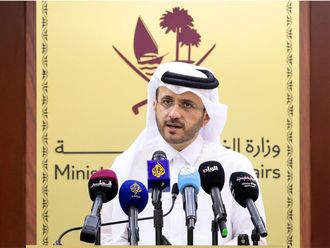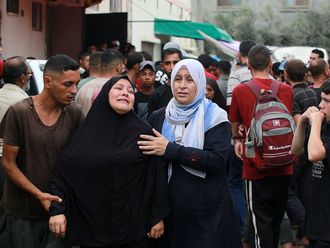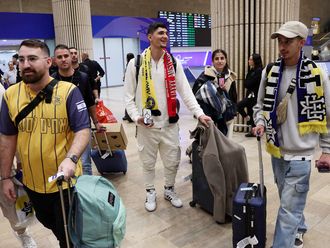Tripoli: Water started flowing again in several areas of Tripoli on Monday, putting an end to an outage of more than a week that rebels blamed on sabotage by retreating Muammar Gaddafi loyalists.
Tripoli's nearly 2 million residents had survived on brackish water from wells and drinking water delivered by trucks and ships from neighbouring countries.
After water flowed from faucets again Monday, some residents rushed out to celebrate by washing their cars. "Thank God, everything is going to be all right," said Ali Hamed, a resident of Tripoli's western neighbourhood of Dreibi, as he sprayed his car with water from a hose.
The disruption of the water supply posed a major challenge for the new leaders as they tried to take control of Tripoli. Opposition fighters entered the city on August 21, but ousted remaining Gaddafi loyalists only after a week of fierce street battles. Since then, the new rulers have struggled to restore services, including water, electricity and garbage collection.
Usama Al Abed, the deputy mayor of Tripoli, said that by Monday evening, water had been restored to more than 70 per cent of Tripoli. It was not immediately clear if the water was back for good and if all the damage had been repaired.
The water crisis served as a reminder of the long reach of Gaddafi, even as he is on the run and his remaining loyalists find themselves encircled in a shrinking number of strongholds.
Officials have given conflicting accounts of what happened to the water.
Jalal Al Gallal, a spokesman for the rebels' interim government, said Monday that retreating Gaddafi forces deliberately destroyed water pumps on the outskirts of Tripoli. The pumps are part of the "Great Manmade River Project," a vast network of underground pipes and channels that is fed by aquifers deep in the Sahara Desert.
Last week, another senior official, Aref Ali Nayed, told The Associated Press that attacks by Gaddafi loyalists on water engineers trying to restart pumping stations in remote areas of the desert were to blame for the water outage.
In an apparent breakthrough in solving the crisis, a rebel spokesman, Ahmed Bani, said Sunday that the rebels have taken control of the Great Manmade River Project.
For Tripoli's residents, the lack of water came at the worst possible time. Many were pinned down in their homes by fighting during the first days after the revolutionaries rolled into the capital. Over the past week, residents have slowly begun to emerge, but water shortages disrupted the return to normal.
In many neighbourhoods, residents relied on wells that were in use before the capital was hooked up to the water network in the 1990s. However, the well water was brackish and not fit to drink, residents said.
The UN has shipped several million bottles of drinking to Tripoli's port and distributed them via hundreds of mosques. On Monday, pickup trucks sent by mosques waited at the dock to take their allotment for distribution.
One truck loaded four pallets for an area in the Souk Al Jumma neighbourhood. Volunteers went house to house, dropping off one six-pack of large bottles for each family.
One of those receiving free bottled water, Massoud Mohammad, said he managed for the past two weeks with well water for washing and bottled water for drinking.
Mohammad and others in the neighbourhood said they didn't blame Libya's new rulers for the delays in turning the tap back on.
"We have been patient for 42 years, so we can wait another month," said Mohammad, a 56-year-old teacher of Arabic, referring to Gaddafi's lengthy rule.










